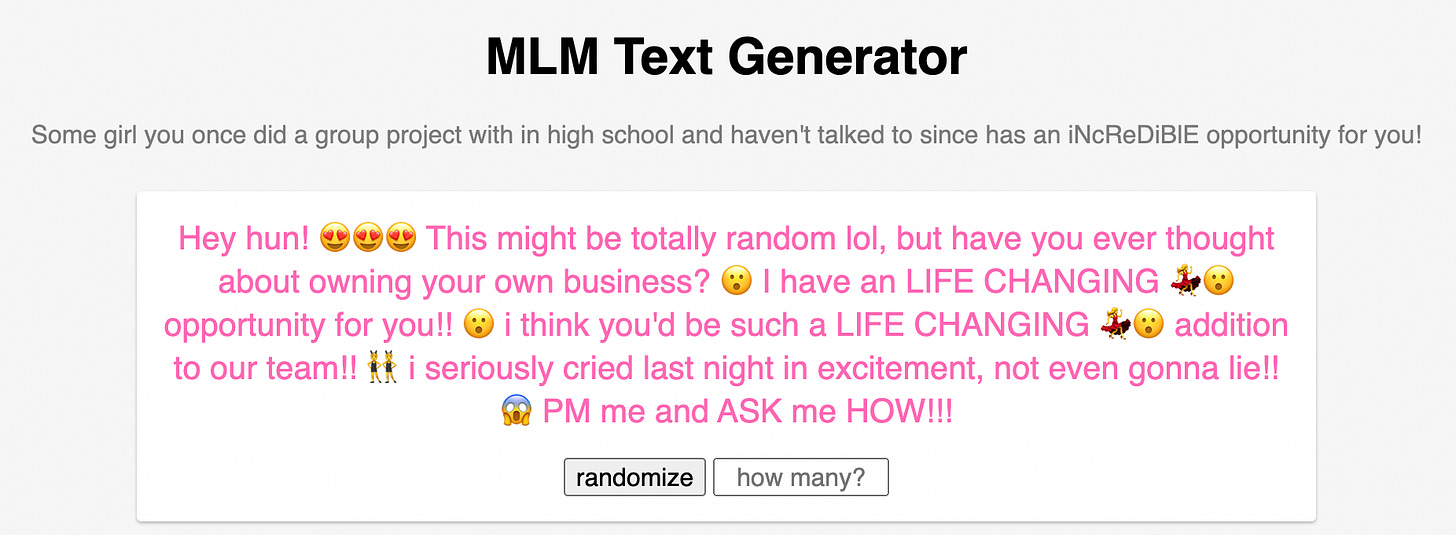What Cult Are You a Part Of?
Being human is low key hard... and other things I learned from "Cultish" by Amanda Montell
Not me writing my January book club review in March… whoopsie! Like I said before, this is a very loosey goosey operation we got going on here. I did in fact finish reading the book by the end of the month and had my notes prepped for this review (to everyone’s shock and awe, I know), but then February truly got the best of me as I was trying to see everyone and their mother after being out of town for so long. But it’s nice to be back to being boring again, because that means I can’t avoid my personal commitments and goals — including this one — anymore, yay!
To refresh everyone’s memory, January’s non-fic pick was Cultish: The Language of Fanaticism by Amanda Montell, who is a linguist and host of the podcast “Sounds Like A Cult.” As her website very succinctly describes, in this book she “argues that the key to manufacturing intense ideology, community, and us/them attitudes all comes down to language. In both positive ways and shadowy ones, cultish language is something we hear—and are influenced by—every single day.”

This was such an interesting read for my first selection, because I really didn’t have any expectations going in, but coming out I’ve found myself noticing cultish language and behavior so much more. Part of the time I was listening to the audiobook, I was on a trip to India visiting my extended family. One evening, my parents and I made a pit stop at a coffee shop and a TV screen was playing the news. The prime minister had opened a new Hindu temple on disputed sacred land and about half a million people paid visit that day, including Bollywood celebrities and other elite circles. As images flashed across the screen of people lined up and down the surrounding area, chanting and raising their hands, illuminated in the dark by red and orange lights, I got an eerie feeling in the pit of my stomach even as someone who has watched countless Hindu processions and celebrations growing up in my community. Maybe it was the tie of religion to politics, but there was something dare I say… cultish about it.
If I think too hard about how much cultish language and behavior is embedded in our culture from spirituality to fandoms to gym memberships, it kinda freaks me out TBH. However, I think Montell does a great job at destigmatizing these experiences and stories, and bringing a more nuanced perspective of how they often escalate. She talks about how her own father grew up in the cult, Synanon, before becoming a renown scientist and his stories were a major inspiration for writing this book. Here’s a couple of observations she made that particularly resonated with me.
Trying to avoid capitalism? You might find yourself in a cult. With the rise of the loneliness epidemic and a tumultuous political and economic state, I feel like two core essentials of human life — finding community and finding your purpose — have become so much harder for everyone. And for the few who dare to stray off the paved path or dream a little larger than their given circumstances, it can just as easily turn into being caught on another conveyor belt, this one just benefitting a different leader.
I was struck by the number of larger case studies Montell provides of cults that were born from those simply seeking an alternative lifestyle, such as the desire for socialism or commune life. So much of the cultish language she describes is filled with anti-establishment rhetoric and the promise of being seen and heard in a way you may not have been under the current systems in place.

Even something to a much lesser degree of straying from societal pressures, such as pursuing a non-traditional career path in the arts requires a level of self-belief and imagination vulnerable to cultish interference. Montell writes,
I suppose for aspiring actors in Los Angeles or dreamers anywhere really, it’s something of an occupational hazard. Whether you’re on a quest for spiritual enlightenment, eternal salvation, or a Tom Cruise level of renown so powerful that you essentially become a god on Earth, devoting your life to something so behemoth that heaven itself is on the line requires big risks, tough commitments, and a pretty intense suspension of reality to believe it’s possible. The stakes are just that high. In some cases, you get out within a few hours a little bit shaken. In others, you lose everything, but there is always a story. As soon as you get your language back, you can tell it.
This quote shook me to my core and also confirmed to me that I’m the prime candidate for cult membership. Less so because I’d like to become the next Tom Cruise, and more so because despite my outward cynicism, deep down I am a dreamer. Often to my own demise, I’m constantly questioning the bounds of what’s possible and overthinking whether I’m on the right path in life. Luckily for me, this mindset also makes for good writing material, so thank god I pour my heart into that instead.
What happens when you girl-boss too close to the sun. Let’s talk about the faux feminism of it all. One of the cultish phenomenons Montell dives into are MLMs, which often target women who are seeking financial empowerment and independence, and most likely have been disenfranchised in other area(s) of their lives. Even though the structure of MLMs themselves reflect the hierarchy of privilege that exists within capitalism — with a few at the top reaping the benefits of those at the bottom — the language used is once again, very anti-establishment. Bosses are seen as “jackasses,” and having a “normal” corporate job is seen as derogatory compared to being a “self-made entrepreneur.” Sticking it to the man is all fun and games until you’re left in debt trying to sell tummy tea detoxes.
I used to religiously watch this fitness and lifestyle influencer on YouTube who was so clearly peddling weight loss products. I fancy myself a mildly aware individual, and yet I watched, as she transformed to her dream body weight over the weeks, and after proving her own success with the supplements, she began offering consultations for her viewers. I knew it was a scam, but secretly I wanted to be one of the lucky ones to shed a few pounds too. The thing that fascinated me the most was how she got started on the system: her own mother, who had grown her own clientele enough to the point where she attended exclusive conferences and enjoyed some of the perks of making it farther up the ladder.

I’m reminded of the time a girl on IG reached out to me in college, with the prepared MLM speech and an almost desperate air of becoming friends. Or when I felt so deeply guilt-tripped by my sorority “standards” board in a last ditch attempt at persuading me to not drop out after I’d already told them my decision, that I burst into tears in the meeting. It actually makes me so sad (and mad) that a lot of cultish behavior preys on women’s insecurities and false sense of losing solidarity with other women.
Oops, I think I accidentally became a sellout. As someone who works in the branded content space and has very complicated feelings about it, this quote fascinated me,
Plenty of modern companies try to sell goods by associating them with larger identity benefits, like by buying this trendy lipgloss or that beach towel made out of recycled plastic, you will establish yourself as a hip, healthy, sexy, eco-friendly person in general. Sociologists call these organizational ideologies and they’re not necessarily all bad. Most successful brand cofounders agree that having a cult-like company culture with intense values and rituals is simply necessary to secure repeat customers and loyal employees in today’s dubious, transient market. These organizational ideologies should be taken with a grain of salt of course, since basing one’s politics, healthcare decisions, and very identity on what profit driven brands have to say, even and especially ones that self-identify as ethical, sustainable, etc is risky business. Woke capitalism does not equal social justice.
This basically sums up an internal tension that I find myself thinking a lot about in figuring out where I want to take my career. Besides art-making, one of the most important things to me is activism, but the older I’ve gotten, the more I’ve realized how tricky it is to actually find those two aspects in my day job. I wonder some days if I should completely abandon the belief that activism and art-making can flourish, let alone exist, in the same space as profit.
This excerpt also reminds me of celebrities who unintentionally or intentionally center their whole brand or persona not only around a cause, but around them being a good person: being positive, brave, empathetic, an ally, a feminist, a nice guy. Only later, do we find a skeleton in their closet, rumors that they treat those around them terribly behind the scenes, or perhaps most devastating of all, they turn out to be someone we wouldn’t want to be friends or in a relationship with in real life. We raise them up to cultish status, only to see them fall hard and fast.
I’m curious if any of you have had cultish experiences or stories. If so, please tell me because I recently learned that one of my co-workers accidentally joined a purple shirt-wearing Buddhist cult for six months while she was living in Taiwan, and it literally blew my mind. And of course, if you read Cultish, I would love nothing more than to hear your thoughts.
For our next book club pick, I’m going with Glitch Feminism: A Manifesto by Legacy Russell. I have a cute, pocket-size edition which I’ve re-read the first ten pages of a couple times now (lol) and for whatever reason have never made the leap to finish, so we’re doing it! It sits at the intersection of so many interests I have — gender, sexuality, and the internet. So I’m excited to dive in, and with it being a shorter read and a more academic text, I might try to watch a couple of Russell’s talks as well to help digest it in context.
Hope to see you back for our next book club recap at the end of April / beginning of May, and if I don’t make it on time — I’m just a girl! What do you expect.




